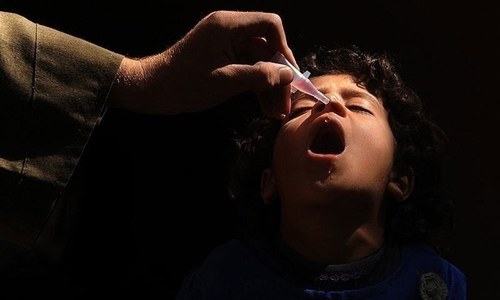In 2017, Pakistan was on the brink of declaring victory against the polio virus. That year, the country, one of the last bastions of the virus in the world, had reported its lowest number of cases in almost three decades.
Three years down the line, health authorities — both local and international — are scratching their heads over how to mitigate the crisis. In the current year so far, the country has reported 72 polio virus cases — a far cry from the eight reported in 2017. The preceding year was even worse, when 134 cases were reported in 2019, sounding alarm bells across the world.
According to the Pakistan Polio Eradication Programme (PPEP), “conflict, political instability, hard-to-reach populations, and poor infrastructure continue to pose challenges to eradicating the disease”.
At the same time, the refusal cases have done tremendous damage. Over the years, various conspiracy theories have been floated with regards to the polio vaccine, ranging from “it causes impotency” to “it is a conspiracy of the West”.
While the PPEP has made a lot of effort to dispel the rumours and raise awareness on the importance of getting children vaccinated, the number of refusals remains alarmingly high. Earlier this year, for example, a health official told Dawn that there were 38,000 refusal cases in January which rose to 51,000 in February in Peshawar district, one of the virus reservoirs in the country.
Why frequent vaccination campaigns are important
In this case, the official attributed the rise in refusal cases to frequent vaccination campaigns. However, frequent vaccination campaigns are organised because children require a certain minimum number doses of the oral poliovirus vaccine (OPV) to ensure their adequate protection against the disease.
Child specialist Dr Iqbal Memon says that in a country like Pakistan “15 or more [doses of OPV] are considered adequate protection”.
The OPV, explains Dr Memon, is cheaper, widely available and easier to administer, hence it is recommended for use in developing countries. “Given multiple times … it leads to better control against wild polio virus in sewage as well,” he says. The only challenge to its delivery is ensuring that the cold chain supply is maintained.
In contrast, says Dr Memon, the inactivated poliovirus vaccine (IPV) must be administered intravenously, which is a challenge because it must be done through trained hands. It is also more expensive and much harder to procure. In the case of IPVs however, a couple of doses are enough to ensure immunity.
“In Pakistan, we need both [OPV and IPV],” says Dr Memon. “Hence both are part of Pakistan's essential immunisation programme. Ideally, if IPV is available, two doses along with an OPV course would be appropriate,” he explains.
According to Dr Ali Faisal Saleem, an infectious diseases expert at the Children's Hospital at Aga Khan University Hospital, "OPVs are administered as oral drops, which boost the child's immunity and are hence more important in a country like Pakistan, where the polio virus is still prevalent." The IPV, on the other hand, aids the OPV in such cases, says Dr Saleem. He adds that without the OPV, the IPV dose would be ineffective.
Safe for newborns
Asked if the vaccines are safe to be administered to newborns, Dr Memon says there were no known side effects and that it is safe to administer multiple doses of OPV even to newborns.
Dr Saleem agrees, saying, "OPV is administered to all newborns in Pakistan at the time of birth. That is called dose zero. Thereafter, the vaccine is given to children at six weeks, 10 weeks and 14 weeks, after which they can be administered the vaccine every time there is a routine immunisation campaign." It is completely safe to administer as many doses of OPV as possible, he reiterates.
Stressing the importance of the vaccine further, Dr Saleem points out that globally, polio has been eradicated from almost all countries through the OPV. "In Pakistan too, all children are supposed to be administered the OPV as part of their routine immunisation at birth."
Can the vaccine be administered on a sick child?
To another question whether the vaccines were safe to be administered to a child who may be otherwise unwell, Dr Memon advises that in cases of mild illnesses, there is no issue with administering the vaccine.
However, he advises that if a child is sick enough to be admitted to a hospital, then it is recommended that the vaccine be administered once the child has recovered enough to no longer require hospitalisation .
With Nigeria having been declared polio-free last month, Pakistan and Afghanistan remain the only two countries that still have the disease.
The world’s eyes are focused on Pakistan and as are our health authorities in efforts to eradicate the virus. Now it's up to the parents and society as a whole to cooperate and encourage a culture of getting children vaccinated not only against polio but against all other vaccine-preventable diseases that can impact them.














































